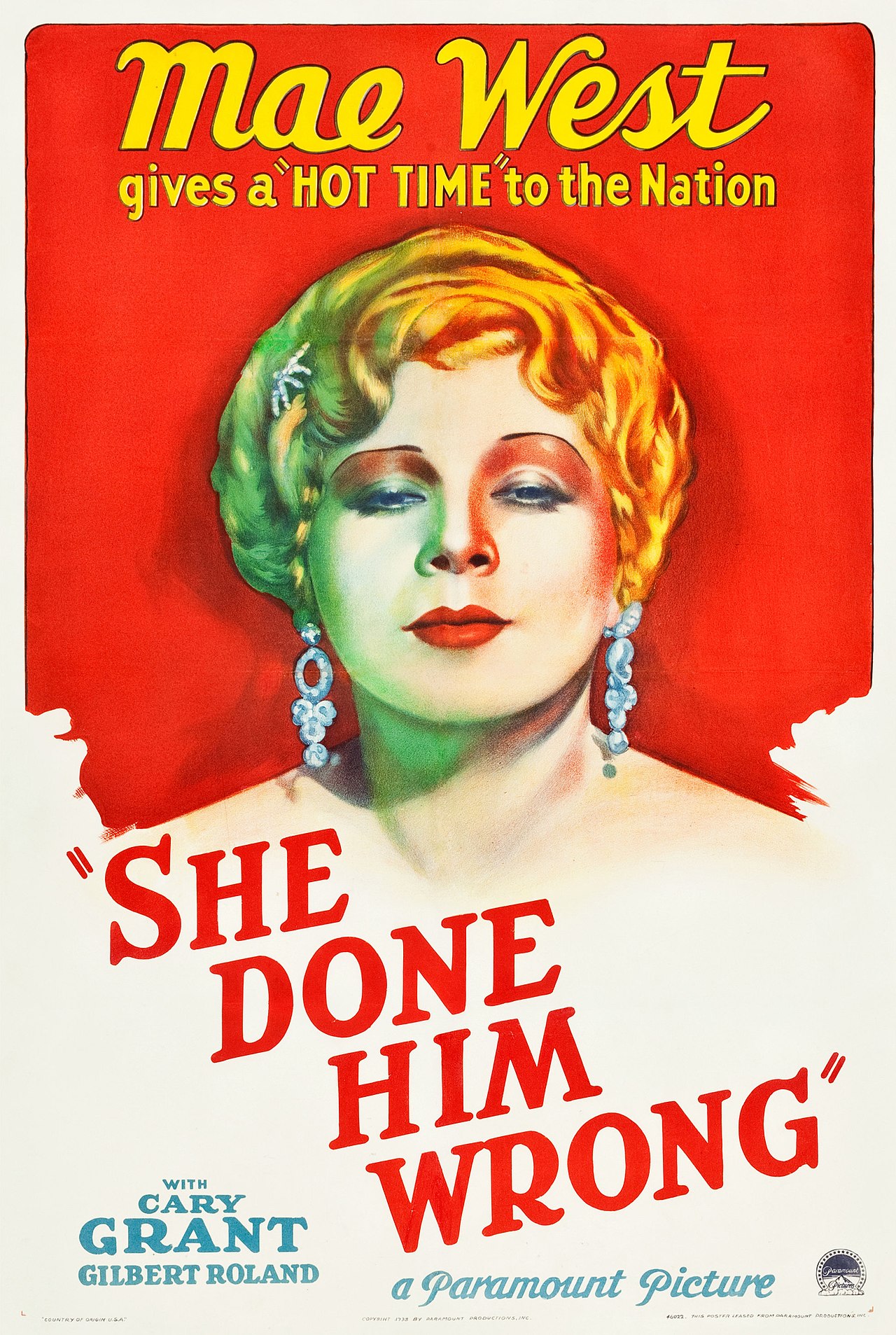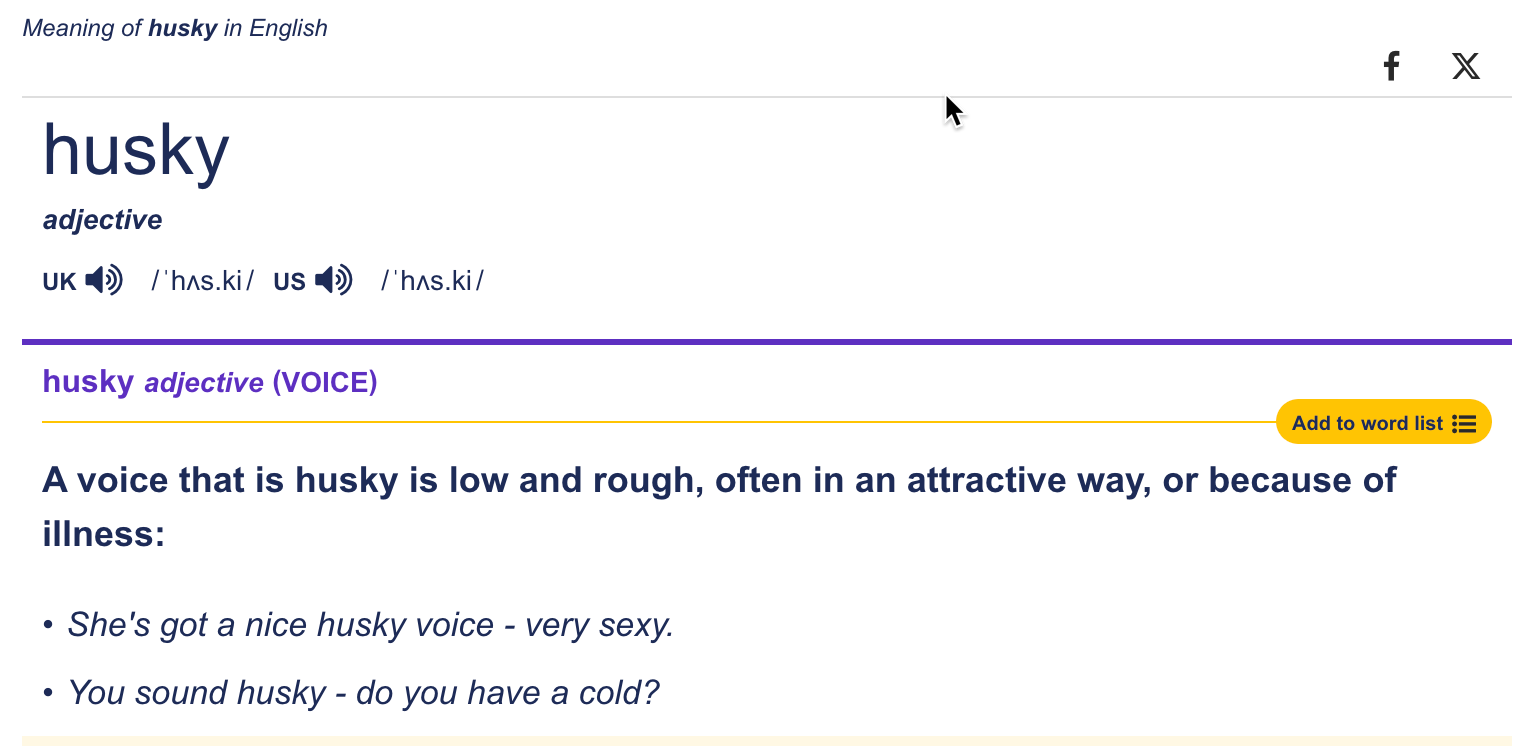The valence of husky voices
« previous post | next post »
 "Vocal Fry" has been in the media yet again, thanks to the recent flurry of interest over "TikTalk" (2/16/2024). As mentioned there, and in my 2011 post "Vocal fry: 'creeping in' or 'still here'?", this speaking style (and media interest in it) has always been with us, with a famous fry influencer from olden days being Mae West, as featured in the 1933 film She Done Him Wrong.
"Vocal Fry" has been in the media yet again, thanks to the recent flurry of interest over "TikTalk" (2/16/2024). As mentioned there, and in my 2011 post "Vocal fry: 'creeping in' or 'still here'?", this speaking style (and media interest in it) has always been with us, with a famous fry influencer from olden days being Mae West, as featured in the 1933 film She Done Him Wrong.
But there's a lexicographic aspect to this as well. According to Mae West's Wikipedia page, "Considered a sex symbol, she was known for her breezy sexual independence and her lighthearted bawdy double entendres, often delivered in a husky contralto voice." However, the OED's gloss for the relevant sense of husky is "Of persons and their voice: Dry in the throat, so that the timbre of the voice is lost, and its sound approaches more or less a hoarse whisper. (An effect of continued speaking, laryngeal inflammation, or violent emotion.)".
Huh? That "husky contralto" is on display in her most famous line, "Why don't you come up some time, see me?". But clearly, the cause is not continued speaking, laryngeal inflammation, or violent emotion. Listen and look for yourself:
Here's an even huskier passage, from later in the same scene:
(FWIW, the whole movie is here, and a selection of Mae West quotes is here.)
So how did the OED get the associations of husky voice so wrong?
Semantic drift, it seems — or at least connotational drift. I took a look at the results of searching the Corpus of Historical American English for "husky voice", and from the decade 2000-2009 there are 29 hits, a clear majority of which are Mae West-ish, e.g.
- All he could see were her eyes, fringed, wide and lovely. All he could hear in his mind was her soft, husky voice.
- […] a luscious mound of trouble played by Scarlett Johansson with a husky voice and neurotic little-girl smolder
- Selma was prone to sensuous scents; sensuous music too, her husky voice holding people hostage when she sang.
But from the decade from 1840-1849 there are 24 hits, and all of them fit the OED's gloss, e.g.
- "Who," he shrieked in a husky voice, turning to the throng — "Who hath done this murder?"
- "Advance, Brother from the New World," he cried in a husky voice — "The tablet marked with the Cross is yours!"
- "Cease! cease, my child!" cried the old man in a thick husky voice, raising her from her knees,
(Note also the shift in gender associations…)
It's not just the OED that's missed the lexicographical husky train — Merriam-Webster and Wiktionary don't do much better. However, the Cambridge Dictionary gets the modern connotation closer to right — maybe because of that dictionary's more recent origin?
I wonder whether there's been a similar evolution in words like French rauque, Spanish ronco/a, German rauchig or heiser …

Coby said,
March 5, 2024 @ 9:42 am
The German rauchig literally means 'smoky', and in fact I am more familiar with a voice like Mae West's described as smoky rather than husky. Heiser, on the other hand, just means 'hoarse', as do both ronco and rauque.
Victor Mair said,
March 5, 2024 @ 10:05 am
Interesting that Coby mentioned "rauchig" ("smoky"). I was just about to mention the idea of a "cigarette voice". Many of the women in the offices at Penn and elsewhere who have this kind of husky voice attribute it to cigarette smoking.
=====
Smoking and Swollen Vocal Folds
When your vocal folds swell, it means their water content has increased, and the result is a deepening of the tone of your voice, whether you're singing or speaking. This also contributes the raspy quality heavily smoke-damaged voices get.
(source — much more interesting, relevant material there)
=====
ktschwarz said,
March 5, 2024 @ 10:48 am
As the post implies but doesn't quite say, the historical OED's entry for husky is unrevised from 1899. It might be clearer to say so explicitly.
Oxford does publish a current dictionary, which last appeared in print in 2010 as Oxford Dictionary of English/New Oxford American Dictionary, and is now licensed to the iPhone and Kindle (through the phone's search function, or by hovering on a word to get a pop-up) and Google (type "define husky"). Their current definition is:
That's clearly been revised not too long ago; the definition doesn't include the "sexy" connotation, but the example quote does.
And although Merriam-Webster hasn't updated the definition, their example quotations do demonstrate the current connotations, e.g.:
Mark Liberman said,
March 5, 2024 @ 11:15 am
@ktschwartz:
One reason that I wasn't specific about the history of the OED's entry is that the online version of the work is ambiguous about it, at least modulo their meanings for "revised" and "modified":
Chris Button said,
March 5, 2024 @ 11:33 am
For me, Lauren Bacall had the quintessential husky voice.
ktschwarz said,
March 5, 2024 @ 11:56 am
Mark Liberman: Yes, that's always been a problem with the online OED. In entries that haven't had Third Edition revisions, the definitions are *usually* unchanged, despite the boilerplate modification notice, but to be certain you have to check the old editions: click through to the Second Edition, look up the First Edition on Hathitrust or the Internet Archive. It's a shame they didn't design it with Wikipedia-style change tracking.
J.W. Brewer said,
March 5, 2024 @ 1:05 pm
Maybe they've caught up in the paywalled version, but the public domain first edition OED scanned by the Internet Archive doesn't have the separate sense of "husky" that wiktionary glosses as "(US, euphemistic) Burly, stout." This online piece from a few years ago claims that it remains a lexicographical mystery, with one academic source telling the writer "Nor did husky as a euphemism for fat appear in any of the dictionaries he regularly consults for such information."* https://melmagazine.com/en-us/story/the-origin-of-husky-the-word-thats-traumatized-generations-of-fat-boys-2
What I find interesting I suppose, is that the positive valence for "husky" applied to voices manages to exist side-by-side in AmEng with the negative valence of this other sense of "husky" applied to boys' clothing sizes and the physiques of the boys who need to wear them, all without any overlap, confusion, or dissonance.
*This being Michael Adams of Indiana University, who is apparently a past president of both the American Dialect Society *and* the Dictionary Society of North America.
Cervantes said,
March 5, 2024 @ 2:01 pm
Is that a dictionary in your pocket, or are you just glad to see me?
JPL said,
March 5, 2024 @ 3:14 pm
ktschwarz:
From your comment I learned with sadness of the passing of the great Marlena Shaw, so I hope you'll forgive me for posting this video exemplifying her rich contralto (and exemplifying Merriam-Webster's understanding of a female voice that could be called "husky") on this vocalese version of Ahmad Jamal's tune "Ahmad's blues" in her memory.
https://www.youtube.com/watch?v=Fo7u-kJAnMM
David Marjanović said,
March 5, 2024 @ 3:49 pm
I confirm that heiser never has positive connotations; it implies you're either ill, or you've been talking for too long without drinking enough.
Victor Mair said,
March 5, 2024 @ 4:54 pm
cf. "throaty" ("deep and husky")
Josh R said,
March 5, 2024 @ 6:47 pm
It seems to me that the original sense of "husky" derived from the noun "husk," indicating something thin and dry, but that the modern sense derives rather from the adjective "husky" meaning "large, burly, robust." It's used for women's voices that are deeper, one might say "full-bodied", but not necessarily hoarse. Etymonline notes "Sense of 'tough and strong' (like corn husks) is first found 1869, American English."
ardj said,
March 5, 2024 @ 8:14 pm
miscellaneous meanderings.
JPL is right that Marlena Shaw is a formidable singer with a rich contralto, but on the evidence of "Ahmad's blues", her voice is not "husky" but pure (wonderfully so) and deep. Professor Mair's reference to tobaccofreelife.org is all too justified to describe what happens (as an emphysemic myself I know) but singers, speakers can also use the effect of withdrawal of timbre.
Mark Lieberman posits a distinction between a voicing with reduced timbre and a voicing that is hoarse, which may indeed be the nature of the OED definition changes: though consulting it online now gives something like "deep, quiet and rough", again an inadequate description, so despite my continuing adoration of the OED, I accept they have (again) got something wrong.
JMBrewer is right to note the alternative meaning of "burly", but it has no relevance here.
A "husky" voice need not sound "rough", in the sense of coarse. though that is of course (sorry) possible.
"husky" to me is a way of speaking or singing using a deep register and with attenuated timbre. You can find it in many basses and contralti and even soprani, used to good effect by such as Paul Robeson or Willard White who have no lack of timbre. Lotte Lenya, despite what one recalls, did not have a husky voice but one she could pitch accurately but also colour to give the impression of withdrawal. Try the later Marianne Faithfull for the real thing.
ktschwarz said,
March 6, 2024 @ 10:26 am
ardj: The OED did not get the definition wrong in 1899. It was right, back then. What they got wrong is their webpage design, which mixes extremely outdated material with current material indistinguishably.
consulting it online now gives something like "deep, quiet and rough": That's from the Oxford Advanced Learner's Dictionary, not the OED. Oxford publishes several different dictionaries. The Learner's Dictionary is a current dictionary, covering a smaller range of words and definitions than the desk-size Oxford Dictionary of English (the one that Google provides), and much smaller than the historical OED. Each has its own editors; their definitions don't have to be identical.
If you really "adore the OED", you should be able to tell whether you're looking at it or not.
ktschwarz said,
March 6, 2024 @ 12:29 pm
J.W. Brewer: as you guessed, the body-shape sense of husky was added to the OED in the 1976 Supplement, derived from the mid-20th-century Dictionary of Americanisms on Historical Principles. Here's the page from the 1989 edition; that's going to need some revision, too, since they define it as "Tough and strong (like a corn-husk); big, strong, and vigorous", missing the development as a euphemism for "fat".
Yes, it's interesting that the voice sense and the body-shape sense are so different; probably a lot of people (like Josh R) think of them as different words. And maybe they are; there's enough room for doubt that American Heritage puts the 'burly' sense in a separate entry, with etymology only "perhaps" from the noun husk.
Prof. Michael Adams apparently overlooked the Random House Dictionary, which by 1987 had entered this definition:
Terry Hunt said,
March 6, 2024 @ 3:36 pm
@ ardj – huskiness (or 'grit', gravel', etc.) can be a permanent feature of some singers' voices, in which case it often indicates damage to the (true) vocal cords: however, many accomplished singers learn how to turn it on and off at will where it's appropriate for the song, and/or the character they may be portraying.
Usually this is accomplished by using not the true vocal cords, but rather other structures in the throat such as the (more robust) 'false vocal cords' which lie above the (delicate) true vocal cords: this avoids damaging the latter.